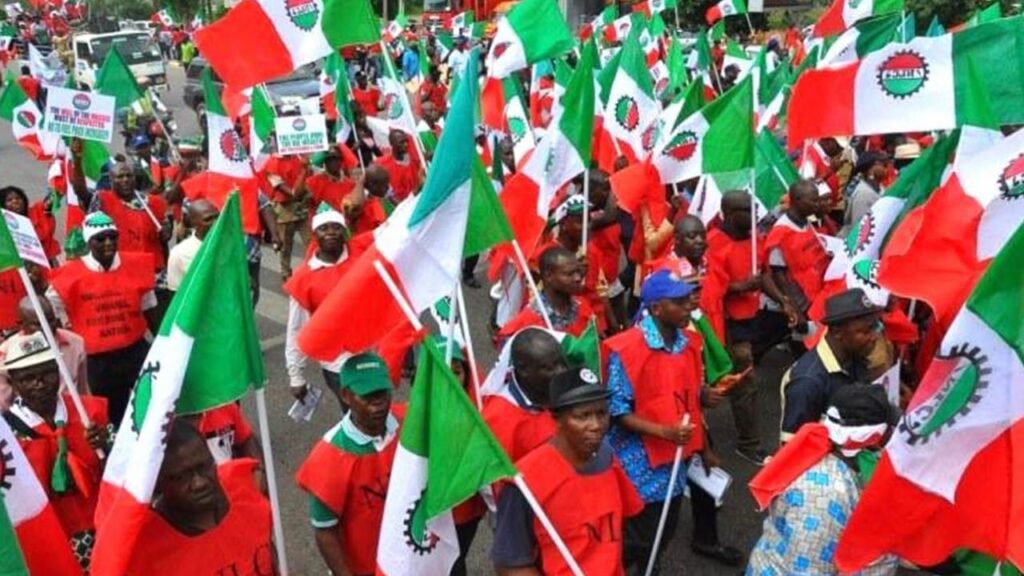Nigeria
Fuel Scarcity Looms as NUPENG Mobilizes for Indefinite Strike Over Minimum Wage

The Nigeria Union of Petroleum and Natural Gas Workers, NUPENG, has instructed its members to adhere to the nationwide strike called for by Organised Labour without a specified end date.
The strike is scheduled to start on Monday.
In a statement released on Saturday, NUPENG General Secretary, Mr Afolabi Olawale, emphasized the union’s dedication to ensuring complete adherence to the directive.
The Nigeria Labour Congress, NLC, and the Trade Union Congress, TUC, jointly announced the indefinite nationwide strike set to commence on Monday.
The purpose of the strike is to demonstrate the frustration of Nigerian workers towards the Federal Government’s rejection of the proposed new minimum wage.
Afolabi expressed the union’s dismay and concern over the Federal Government’s lack of sensitivity towards negotiating a new minimum wage for Nigerian workers.
“This is due to the various socio-economic policies implemented by this administration that have led to the impoverishment of the working class in this country.
“All leaders of our esteemed union, at every level, including units, zones, and branches, must promptly initiate all necessary measures to ensure full compliance with this directive,” he concluded.

Fuel scarcity is an impending crisis as the Nigeria Union of Petroleum and Natural Gas Workers (NUPENG) prepares for an indefinite strike over minimum wage issues. This situation threatens to cripple the country’s oil-dependent economy and disrupt daily life for millions of Nigerians. In this article, we’ll dive deep into the causes, potential impacts, and possible resolutions of this looming crisis.
Background of NUPENG
What is NUPENG?
NUPENG stands for the Nigeria Union of Petroleum and Natural Gas Workers. It is one of the most powerful labor unions in Nigeria, representing workers in the oil and gas sector. Established in 1977, NUPENG has been at the forefront of advocating for the rights and welfare of its members.
NUPENG’s Role in Nigeria’s Oil Sector
NUPENG plays a critical role in Nigeria’s oil sector, which is the backbone of the nation’s economy. The union ensures that the interests of oil and gas workers are protected, negotiates better working conditions, and intervenes in disputes between workers and employers.
The Minimum Wage Dispute
Current Minimum Wage in Nigeria
The current minimum wage in Nigeria is 30,000 Naira per month. However, due to the high cost of living and inflation, many workers, including those in the oil sector, find it insufficient to meet their basic needs.
READ ALSO: TotalEnergies witnesses NNPCL’s successful restoration of 275,000 bpd oil production
NUPENG‘s Demands
NUPENG is demanding a significant increase in the minimum wage to reflect the rising cost of living. The union argues that the current wage is inadequate and calls for the government to fulfill its promise of a living wage.
Government’s Response
The government has been slow to respond to NUPENG’s demands, citing economic constraints and budgetary issues. This lack of action has led to frustration among workers and has set the stage for the impending strike.
Reasons Behind the Strike
Economic Conditions
Nigeria’s economy has been struggling, with high inflation rates and a depreciating currency. These economic challenges have eroded the purchasing power of workers, making it difficult for them to afford basic necessities.
Inflation and Cost of Living
The cost of living in Nigeria has skyrocketed, with prices of goods and services increasing significantly. This has placed immense pressure on workers, who find their wages unable to keep up with the rising costs.
Unfulfilled Promises by the Government
NUPENG has accused the government of failing to honor previous agreements regarding wage increases and better working conditions. This breach of trust has fueled the union’s decision to go on strike.

Implications of the Strike
Immediate Effects on Fuel Supply
An indefinite strike by NUPENG will lead to severe fuel shortages across the country. This will have a ripple effect on various sectors, including transportation, power generation, and industries that rely on fuel.
Long-Term Economic Impact
The prolonged strike could cripple Nigeria’s economy, leading to significant revenue losses and a slowdown in economic activities. It could also deter foreign investors who might view the country as unstable.
Potential for Social Unrest
The fuel scarcity and economic hardships resulting from the strike could trigger social unrest. Protests and demonstrations could erupt, further destabilizing the country.
Public Reaction
General Public Sentiment
The general public is anxious and frustrated about the looming strike. Many fear the hardships that will come with fuel scarcity and are urging both the government and NUPENG to reach a resolution quickly.
Reactions from Different Sectors
Various sectors, including transportation and businesses, are bracing for the impact of the strike. Transport operators are concerned about the fuel supply, while businesses fear disruptions that could affect their operations.
Government’s Position
Statements from Government Officials
Government officials have made several statements, urging NUPENG to reconsider the strike and promising to address their concerns. However, these assurances have not translated into concrete actions.
Measures Being Taken to Address the Issue
The government has proposed setting up a committee to negotiate with NUPENG and explore possible solutions. However, the union remains skeptical about the effectiveness of these measures.

NUPENG’s Strategy
Mobilization Efforts
NUPENG is mobilizing its members across the country, preparing them for the strike. The union is also garnering support from other labor unions to strengthen its position.
Previous Strikes and Their Outcomes
NUPENG has a history of successful strikes that have forced the government to concede to its demands. The union is banking on this track record to achieve a favorable outcome in the current dispute.
Economic Analysis
Impact on Nigeria’s Economy
The strike will have a detrimental impact on Nigeria’s economy, exacerbating existing challenges and causing significant revenue losses. The oil sector, which is a major revenue source, will be particularly hard hit.
Potential Losses in Revenue
Nigeria stands to lose billions of Naira in revenue due to the strike. This will further strain the country’s finances and could lead to cuts in public spending.
Comparisons with Past Strikes
Past strikes by NUPENG have had significant economic impacts, but the current strike is expected to be more severe due to the prevailing economic conditions.
Social Impact
Effect on Daily Life
Fuel scarcity will disrupt daily life for millions of Nigerians. Transportation will become difficult, power outages may increase, and the prices of goods and services are likely to soar.
Consequences for Vulnerable Populations
Vulnerable populations, including low-income families and those in remote areas, will be the hardest hit. They will struggle to access essential services and may face increased hardships.
International Perspective
How the International Community Views the Strike
The international community is watching the situation closely. There are concerns about the stability of Nigeria, which is a key player in the global oil market.
Implications for Foreign Investments
The strike could deter foreign investments, as investors may view Nigeria as a high-risk environment. This could have long-term repercussions for the country’s economic growth.
Possible Resolutions
Potential Solutions to the Dispute
Possible solutions include increasing the minimum wage, providing subsidies to workers, and implementing policies to control inflation. Both parties need to engage in meaningful negotiations to find a resolution.
Role of Negotiation and Mediation
Negotiation and mediation are crucial in resolving the dispute. Independent mediators could help bridge the gap between NUPENG and the government, facilitating a mutually beneficial agreement.
Role of Media
Media Coverage of the Strike
The media is playing a significant role in covering the strike, highlighting the issues and keeping the public informed. This coverage influences public opinion and puts pressure on both parties to resolve the dispute.
Influence on Public Opinion
Media coverage shapes public opinion, creating awareness about the reasons behind the strike and its potential impacts. It also encourages public discourse on the need for a resolution.
Expert Opinions
Views from Economists and Political Analysts
Experts believe that the strike could have severe economic and social consequences. They emphasize the need for a swift resolution to prevent further damage to the economy.
Predicted Outcomes
Analysts predict that the strike could either lead to a quick resolution if the government concedes to NUPENG’s demands or result in a prolonged standoff with dire economic consequences.
